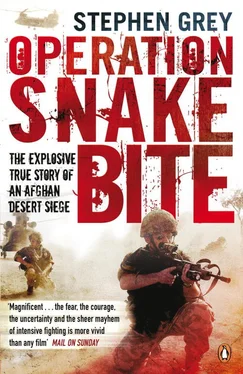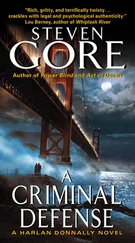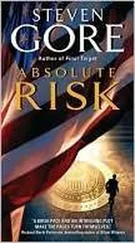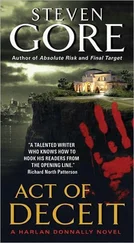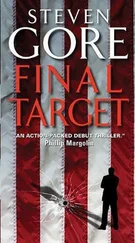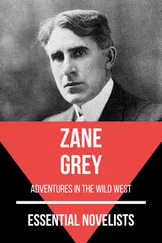‘It was embarrassing,’ recalled Staff Sergeant Rob Sinclair, a troop leader in the KRH. ‘We basically picked up these militia, dropped them off, and went, “Right, someone should be here to collect you.” And no one was.’
The British asked around the Afghans to see if anyone had a mobile phone or Mullah Salaam’s number. Everyone was waving phones around, struggling to find a signal. Someone reached Mullah Salaam. The British said: ‘Where are you? We need to come and drop these guys off.’ But Salaam demanded to know who this militia force actually was. The soldiers had been told that Nick Muhammad was some kind of best friend of Salaam. Now they heard he did not know him.
Salaam asked if the militia had heavy weapons like large-calibre machine guns. The militia too were saying, ‘We’re not fighting if you haven’t got any heavy weapons.’ At that point, the interpreter handed the phone over to the soldiers. There was an English-speaking voice on the line. There was someone inside the compound with Salaam. ‘Oh hello,’ he said. ‘Can I speak to whoever’s in charge?
The conversations went round in circles. It seemed they would have to take the militia back and ‘find a way to get rid of them’. Salaam did not want them. The British were not going to give Nick Muhammad more weapons. Mullah Salaam said, ‘Well, I don’t want the guys then.’ To add to their problems, one of the Mastiffs had now broken down. A fan belt snapped. It was getting dark. Things were edgy. They did not know if the village in gunshot range was really friendly. Had they been lured into an ambush?
At Brigade headquarters, the events were being followed closely. With the plan collapsing into bits, the army was being asked to disarm the militia – and essentially have them arrested.
One officer described watching Brigadier Mackay completely ‘losing his rag’ with a liaison officer from ‘another agency’. The brigade commander was someone who rarely lost his cool but that night was a complete ‘cluster fuck’, what another senior officer described as a ‘monstrous distraction’. One staff officer described the sight of the adviser and the commander arguing it out as ‘the highlight of my tour’. If this whole thing had been a training exercise, ‘no one could possibly have made this up’.
‘It was all their plan,’ said one senior military officer, speaking of officials in Kabul, ‘and it was hopeless. They had sent a militia down without supplies or the right equipment, with no decent form of transport and with no means to extract them.
Colonel Ed, whose men had taken the militia up to Shah Kariz, was supposed to be launching an assault within hours. And added to that was a real concern from the troops on the ground that all this could ‘kick off’ into a nasty violent incident.
In some ways, all the frustration of the last few weeks had come to a head, all that talk from Kabul of a tribal uprising, or all these armed men that Salaam was going to bring over, of this ‘tribal solution’ to the capture of Musa Qala. For weeks now, said the officer, ‘we were being fed a line that we didn’t believe and we had to swallow it’. Now the brigade was being told, in the dark in the desert, to ask this increasingly angry group of men to hand back their weapons and ammo, and the 64,000 dollars they had been given for Salaam.
The militia were to be sent back in the Mastiffs to the southern block position under the command of the Royal Marines and Stuart Birrell.
Back at the Royal Marines operations centre in Camp Bastion, a senior officer took a call from Kabul.
‘Can you take the militia to the Afghan police in Sangin? They will arrest them,’ he was told.
‘Are you aware of what that will mean? The police will also take all of your money they are carrying? And do God knows what else,’ said the officer, imagining rape and murder.
‘OK, so can you disarm them?’
‘You are saying that you want our soldiers to take these armed and scared ex-Taliban in our vehicles and take all their weapons and their money away?’
‘Yes, that’s right.
‘Wrong answer,’ said the officer in Bastion.
Now Zad district centre, 10.30
Captain James Manchip and James Fraser were artillerymen: trained in the observation of the enemy and in the direction of gunfire on to enemy positions. Today, their jobs were rather different. Attached to the 2 Yorks battle group, they and their team of just six other men were up in Now Zad not to train, or hardly even to mentor. They were here to lead almost 100 Afghans into battle.
Thirty-five-year-old Manchip and his sergeant-major were standing in a compound in one of the most eerie places in Afghanistan. Now Zad had once been a pleasant market town in a desert oasis. Now, its streets were deserted. It was a ghost town that echoed in the wind to the sound of doors banging on empty compounds, or the barks of wild dogs, or then suddenly to the booms and cracks of explosions and gunfire. The British and their allies held the district centre and a fortified hilltop. But their occupation was symbolic. After months of fighting, the population had voted with their feet and left the town.
There was a time the tall ridges of mountains on either side of the town must have been welcomed for their cooling shadows, giving the place the feel of an alpine resort or hideaway. Now, the mountains seemed just dark and menacing. The chopper pilots had labelled a gap in the peaks where they would dash through to land as the ‘gates of hell’. A lot of blood had been shed in this place.
Manchip and Fraser were listening to the sound of a contact. Up to the north, the Estonians were fighting hard. The cracking sound of bullets from the Taliban and the NATO troops were hard to tell apart. Estonia being a former Soviet satellite, these troops were equipped with Russian hardware, a fact that the Taliban used to claim was very useful. (They could steal their ammunition and use it in their own guns, also of Russian design.) Some of the Estonian commanders had even been here before – fighting as soldiers with the Soviet army in the 1980s. On the ridge behind the compound, the Royal Marines mortar lines were busy in support. There was a croak of an Apache helicopter’s cannon and the crump of the RPGs being fired up in response. In most places in Helmand, thought Manchip, the helicopter’s arrival would have silenced the enemy. ‘They’re brave here. They’re not scared of Apaches,’ he figured. A rocket aimed at the ridge came arcing into the town centre. They could hear its whistle as it neared, and it exploded about 200 yards away.
Glancing at his watch, Manchip gave the order to form up and move out. The Estonians had attacked to the north. His plan was to attack to the south. The orders were to disrupt and deceive. Brigadier Mackay wanted the Taliban to take a beating up here to destroy any idea they might have of coming down to reinforce Musa Qala. Manchip was to fight but not to become ‘decisively engaged’. The mission was to divert the Taliban, not NATO. Mackay didn’t want to have to send other forces up to rescue them.
The idea of mounting this operation had come at short notice. When the initial orders came through at Camp Shorobak, Manchip had been told he would have just two British vehicles and two platoons from an ANA company in a motley collection of fourteen trucks. They would be driving more than 50 miles up through the desert to Now Zad on their own, without any air controller or any kind of heavy weapons. The night before they moved, things improved a bit. Four American gun trucks with twelve men from the Green Berets were chopped over to join them. All would be under Manchip’s command. It seemed unbelievable – an artillery captain directing US special forces.
Читать дальше
